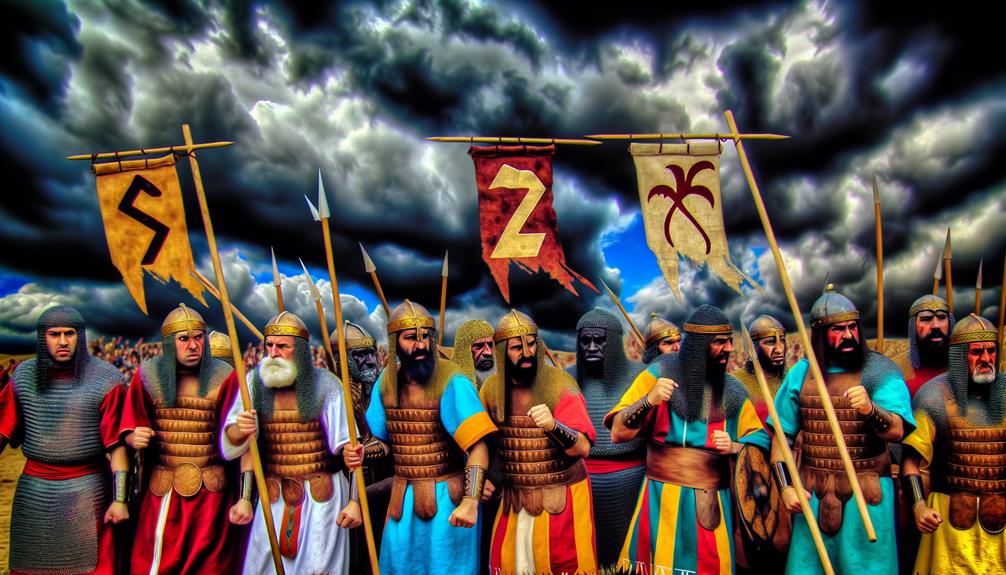Meaning of Zebulun in the Bible: Dwelling and Blessing
Zebulun, the sixth son of Leah and Jacob, derives his name from the Hebrew root ‘zabal,’ meaning ‘to honor’ or ‘to dwell.’ This name encapsulates themes of familial dynamics and maternal fulfillment in the biblical narrative. Jacob’s blessing in Genesis 49:13 emphasizes Zebulun‘s future prosperity with maritime trade and strategic coastal settlements.
Moses’ blessing in Deuteronomy 33:18-19 further underscores the tribe’s economic and cultural significance through active participation in seafaring ventures. Situated between the Mediterranean Sea and the Sea of Galilee, Zebulun’s territory played a pivotal role in enhancing its wealth and influence, offering deeper insights into its historical narrative.

Meaning of Zebulun in the Bible: Tribe, Name Origin, and Spiritual Symbolism
| Aspect | Details |
|---|---|
| Name | Zebulun (also spelled Zebulon or Zebulun) |
| Origin | Hebrew – Zevulun (זְבוּלוּן) |
| Meaning | Dwelling, honor |
| Biblical Reference | Genesis 30:20, Genesis 49:13, Deuteronomy 33:18 |
| Tribal Role | One of the twelve tribes of Israel, son of Jacob and Leah |
| Symbolism | Hospitality, honor, maritime prosperity |
| Spiritual Insight | Represents a place of belonging, divine provision, and blessing |
Etymology of Zebulun

The etymology of the name Zebulun, deriving from the Hebrew root ‘zabal’ which means ‘to honor’ or ‘to dwell,’ offers significant insights into its biblical significance.
In the context of ancient Hebrew culture, names were often imbued with profound meanings and connotations, reflecting the aspirations or circumstances surrounding an individual’s birth.
The root ‘zabal’ underscores themes of honor and habitation, suggesting a dual significance in both social standing and territorial settlement.
This interpretation aligns with Zebulun’s later portrayal in biblical texts, where the tribe of Zebulun plays a notable role in Israelite history. Zebulun’s significance is further highlighted alongside figures such as Zerubbabel, a prominent leader during the return from Babylonian exile. Zerubbabel’s role in the Bible illustrates the resilience and leadership within the Israelite community, paralleling the contributions made by Zebulun in the nation’s early history. Together, these narratives demonstrate the enduring legacy of the tribe as a vital part of Israel’s collective identity and spiritual journey.
Such etymological analysis not only enhances our understanding of the name itself but also provides a window into the cultural and theological milieu of the time.
Zebulun’s Birth Story

Zebulun, Leah’s sixth son with Jacob, holds a significant place within the Biblical narrative, reflecting themes of divine favor and familial dynamics.
Jacob’s blessing upon Zebulun, as recorded in Genesis 49:13, underscores his future prosperity and maritime significance.
The etymology of Zebulun’s name, derived from the Hebrew root ‘zabal,’ meaning ‘to honor’ or ‘dwell,’ encapsulates both his mother’s gratitude and his destined role among the tribes of Israel.
Leah’s Sixth Son
In the biblical narrative, Leah’s joy and sense of validation are palpable when she names her sixth son Zebulun, signifying honor and dwelling. This act is deeply rooted in the socio-cultural context of ancient Israel, where names often carried profound significance.
Leah declares, ‘God has endowed me with a good gift; now my husband will dwell with me’ (Genesis 30:20, ESV). The name Zebulun, derived from the Hebrew root ‘zabal,’ reflects Leah’s hope for increased intimacy and recognition by her husband Jacob.
This naming also underscores the patriarchal importance placed on bearing sons, which Leah viewed as a means to secure her position within the family hierarchy. Consequently, Zebulun’s birth encapsulates themes of divine favor, familial dynamics, and maternal fulfillment.
Jacob’s Blessing
Jacob’s blessing to Zebulun, as recorded in Genesis 49:13, envisions a prosperous future for his descendants, highlighting their maritime activities and strategic coastal settlements.
This prophetic declaration emphasizes Zebulun’s connection to trade and navigation, reflecting a significant role in Israel’s economic and military landscape. The specific reference to dwelling ‘by the seashore’ and becoming a ‘haven for ships’ suggests a strategic geographical advantage.
This prophetic insight can be understood through:
- Economic Prosperity: Zebulun’s descendants would benefit from maritime trade routes.
- Strategic Location: Coastal proximity would provide important military and trading advantages.
- Cultural Influence: Engagement with diverse cultures through sea routes would enrich Zebulun’s lineage.
Understanding these elements offers deeper insights into the tribe’s historical and biblical significance.
Significance of Name
The significance of Zebulun’s name is intricately tied to the circumstances of his birth, as narrated in Genesis 30:20.
Leah, his mother, expresses her hope for greater honor and attachment within her family. Leah, feeling unloved by her husband Jacob compared to her sister Rachel, names her sixth son Zebulun, which is traditionally understood to mean ‘dwelling’ or ‘honor.’
This nomenclature reflects her desire for Jacob to finally dwell with her and recognize her enduring contributions. Leah’s aspiration encapsulates the complex dynamics of familial relationships and social standing within the biblical narrative.
Consequently, Zebulun’s name not only signifies Leah’s personal plea for acknowledgment but also echoes broader themes of belonging and honor in ancient Israelite culture.
Zebulun in Jacob’s Blessing

In Jacob’s blessing, Zebulun is prophetically characterized by future maritime prosperity and strategic territorial inheritance.
The blessing, recorded in Genesis 49:13, underscores Zebulun’s positioning by the sea, hinting at significant involvement in trade and commerce.
This prophetic insight not only elucidates Zebulun’s economic potential but also foreshadows the tribe’s advantageous land allotment in Canaan.
Prophetic Promises Unveiled
One of the most profound prophetic promises concerning Zebulun is found in Jacob’s blessing, where he foretells Zebulun’s future role and prosperity. The blessing, located in Genesis 49:13, emphasizes Zebulun’s position and its implications:
- Geographical Significance: Jacob prophesies that Zebulun ‘shall dwell at the haven of the sea,’ indicating a strategic and prosperous location near maritime routes.
- Economic Prosperity: The reference to Zebulun’s proximity to coastal trade routes suggests future economic wealth and involvement in commerce.
- Tribal Identity: Jacob’s words underscore Zebulun’s unique identity within Israel, highlighting its role in facilitating trade and cultural exchange.
This blessing outlines Zebulun’s anticipated prominence and its integral part in Israel’s collective destiny.
Maritime Trade Insights
Drawing from Jacob’s blessing, Zebulun’s maritime trade insights reveal a profound connection between geographical positioning and economic prosperity.
In Genesis 49:13, Jacob prophesies, ‘Zebulun shall dwell at the haven of the sea; he shall become a haven for ships.’ This prediction emphasizes Zebulun’s strategic coastal location, facilitating engagement in maritime commerce.
Historical and archaeological evidence suggests that the tribe’s proximity to key ports enabled robust trade networks, enhancing wealth and influence.
The region’s access to Mediterranean sea routes likely contributed to its economic significance, affirming the correlation between geographical advantages and commercial success.
Consequently, Jacob’s blessing encapsulates the integral role of Zebulun’s location in fostering a thriving trade environment.
Tribal Land Inheritance
Jacob’s blessing in Genesis 49:13 not only underscores Zebulun’s maritime prowess but also delineates the tribe’s territorial inheritance, which played an essential role in its socio-economic development.
Zebulun’s land, situated between the Mediterranean Sea and the Sea of Galilee, provided strategic access to trade routes and maritime activities. This geographical positioning facilitated the tribe’s economic prosperity and cultural interactions.
Key aspects of Zebulun’s territorial inheritance include:
- Strategic Location: Positioned between major bodies of water, enhancing trade opportunities.
- Economic Prosperity: Accessibility to trade routes fostered wealth accumulation.
- Cultural Exchange: Interaction with various cultures due to maritime activities enriched societal development.
These elements collectively highlight the significance of Zebulun’s inherited land in its historical and economic narrative.
Moses’ Blessing on Zebulun

Moses’ blessing on Zebulun, as recorded in Deuteronomy 33:18-19, underscores the tribe’s future prosperity and its essential role in maritime trade and cultural exchanges.
The blessing highlights Zebulun’s joy in their ‘going out,’ signifying their active participation in seafaring ventures and commerce.
In addition, Moses mentions that Zebulun will ‘summon peoples to the mountain,’ indicating their influential position in facilitating cultural and religious interactions.
The prophetic nature of this blessing suggests that Zebulun’s geographic location and economic activities would not only bring wealth but also foster significant intercultural relationships.
This blessing encapsulates the envisioned legacy of Zebulun as both a prosperous and pivotal tribe within the broader narrative of Israel’s development.
The Tribe of Zebulun

The Tribe of Zebulun, one of the twelve tribes of Israel, played a significant role in the socio-economic and cultural landscape of ancient Israel. Situated in the Galilee region, Zebulun’s territory was strategically located, fostering trade and interaction with neighboring regions.
Several key aspects highlight the tribe’s importance:
- Economic Influence: Zebulun’s proximity to trade routes, including access to the Mediterranean Sea, facilitated economic prosperity through commerce and trade.
- Cultural Contributions: The tribe contributed to the cultural richness of Israel through its artisans and craftsmen, enhancing religious and everyday life.
- Geopolitical Significance: Positioned between major tribes and regions, Zebulun acted as a vital buffer, maintaining stability and security within Israel.
These elements underscore Zebulun’s integral role in ancient Israelite society.
Zebulun in Biblical Battles

Demonstrating their martial prowess, the tribe of Zebulun played a pivotal role in several key battles documented in the Hebrew Bible.
Importantly, in the Book of Judges, Zebulun is highlighted for their valor in the battle against Sisera, where they joined forces with Deborah and Barak, appreciably contributing to the Israelite victory (Judges 4-5). The tribe is also mentioned in the Song of Deborah, where their courage is lauded (Judges 5:18).
Additionally, Zebulunites were among the forces that supported King David in Hebron, showcasing their unwavering commitment to the Israelite cause (1 Chronicles 12:33, 40).
Their military contributions reflect Zebulun’s integral role in the historical and theological narratives of ancient Israel.
Zebulun’s Territory and Geography

Beyond their martial achievements, the tribe of Zebulun was also distinguished by the strategic location of their allotted territory, which played a notable role in their economic and cultural interactions within ancient Israel.
Positioned between the Mediterranean Sea and the Sea of Galilee, Zebulun’s territory facilitated trade and communication. This advantageous placement is evidenced through:
- Trade Routes: Zebulun’s land included major trade routes that connected key economic hubs.
- Maritime Access: Proximity to the sea allowed the tribe to engage in fishing and maritime commerce.
- Cultural Exchange: The region’s connectivity fostered interactions with diverse cultures, enhancing their sociocultural dynamics.
These geographic advantages contributed notably to Zebulun’s prosperity and integration within the broader Israelite confederation.
Spiritual Symbolism of Zebulun

In biblical exegesis, Zebulun is often imbued with spiritual symbolism that reflects its pivotal role within the tribes of Israel. Zebulun’s association with maritime trade and prosperity, as mentioned in Genesis 49:13, symbolizes spiritual abundance and outreach. The tribe’s positioning between the sea and the land signifies balance and connection, underscoring the importance of harmony in faith.
| Aspect | Symbolism |
|---|---|
| Maritime Trade | Spiritual abundance and outreach |
| Geographic Position | Balance and connection |
| Blessings | Prosperity and divine favor |
Analyzing Zebulun’s blessings further, Deuteronomy 33:18-19 highlights the tribe’s joy and communal worship, symbolizing collective spiritual rejuvenation. This rich tapestry of symbolism underscores Zebulun’s role in embodying both physical and spiritual prosperity, serving as a beacon of divine favor.
Conclusion
The narrative of Zebulun weaves a rich tapestry through various facets of biblical history, from his birth and blessings to his tribe’s territorial significance and role in battles.
The deeper spiritual symbolism attributed to Zebulun remains a subject of contemplation and interpretation.
What remains to be fully uncovered, however, are the profound layers of meaning and influence Zebulun’s legacy holds within the broader context of biblical lore, awaiting further scholarly exploration and discovery.






